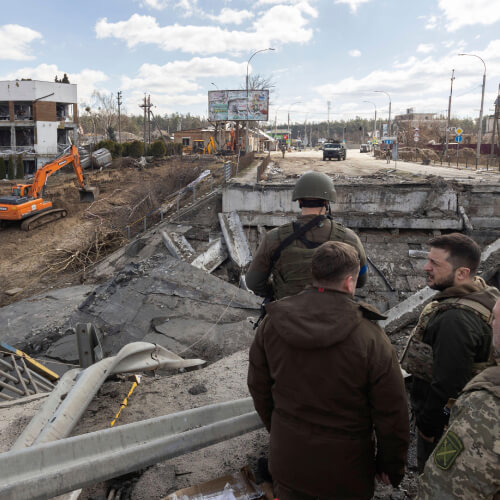Cutting off Russia seems easier said than done
According to a detailed report from Reuters, Extreme Networks supplied telecom equipment to a Russian missile maker. The situation helps to highlight the difficulties around isolating Russia.

With roughly $1 billion in sales, Morrisville, North Carolina-based Extreme Networks is a rising challenger to the likes of Cisco and HPE in the enterprise networking market.
And up until a few weeks ago, it was a quiet supplier to a Russian missile manufacturer.
Although Extreme today vows that it is no longer supplying equipment to Russian military contractor MMZ Avangard, the development nonetheless highlights the difficulties that some companies have had in actually exiting the Russian market following that country's invasion of Ukraine.
Figure 1:  Russia invaded Ukraine earlier this year.
Russia invaded Ukraine earlier this year.
(Source: Ukraine Presidents Office / Alamy Stock Photo)
And that's important in light of increasing tensions between Western countries and China, and the ongoing efforts by US officials to technologically isolate China's Xi Jinping.
New facts
Extreme is at the center of a lengthy report from Reuters earlier this month outlining the company's ongoing supply of equipment to a variety of companies inside Russia in recent years. Broadly, the detailed report cited a wide range of sources and documents indicating that Extreme continued to do business with questionable distributors that funneled the company's telecom switches and other gear to Russian customers including MMZ Avangard.
Extreme acknowledged the "new facts," and noted in an SEC filing that "information by a news organization" helped the company discover that a former employee had ordered Extreme products on behalf of DEMZ, a front, which transferred Extreme's products to MMZ Avangard. The company said that former employee was "terminated by Extreme for performance issues" and is now working for a Russian distributor.
"The total figure of the misappropriated product sales [in Russia] over five years is currently estimated to be approximately $645,000, representing less than 0.01% of the company's global revenue during that time period," Extreme said, noting it "ceased operations" in Russia in March.
An orderly withdrawal
Of course, Extreme isn't the only company leaving Russia. Two of the world's biggest 5G equipment makers – Finland's Nokia and Sweden's Ericsson – said in August that they plan to fully exit the Russian market by the end of 2022.
China's Huawei, meanwhile, hasn't provided the same clarity. In response to recent questions from Light Reading, the company said only that "it is Huawei's policy to comply with applicable laws and regulations of the countries and regions in which we operate."
Other big telecom suppliers offered more clarity in recent responses to Light Reading. Samsung said its shipments to Russia "remain suspended." Cisco in June said it would "begin an orderly wind-down of our business in Russia and Belarus." HPE also said in June it would proceed "with an orderly exit from the country" after halting sales in Russia.
Dell in August said it would close its offices and cease all Russian operations. The company did not respond to questions from Light Reading about a report from the Moral Rating Agency – an effort backed by British financier Mark Dixon – that called into question the veracity of Dell's early statements on Russia after the country's invasion of Ukraine, including the status of Dell's development center in St. Petersburg.
Mavenir said recently it would wind down its remaining activities in Russia by the end of the year – a noteworthy statement given criticism lobbed at the vendor this summer.
Netcracker, meanwhile, said it has stopped all sales of products and services and suspended all future investments in Russia, which is notable considering the company's extensive reliance on Russian coders.
The developments come as Russia's invasion of Ukraine heads into the winter with no end in sight.
Crime and punishment
Some financial analysts don't expect Extreme Networks to suffer much from its failure to block sales of its equipment to Russian military suppliers.
"We think Extreme is unlikely to face a large penalty over this situation, so we think it is fairly irrelevant for the stock. Separately, our recent demand checks for Extreme [networking equipment] continue to come back with a strongly positive tone," wrote the financial analysts at Rosenblatt Securities in a note to investors.
However, the same isn't true for international communications provider Truphone, which owns Montana-based iSmart Mobile. Under a settlement between the London-based company and the US FCC, Truphone will ensure that any stakes held by Russian investors Alexander Abramov, Alexander Frolov and Roman Abramovich will be divested.
Truphone will also pay a $600,000 fine due to the situation.
Related posts:
— Mike Dano, Editorial Director, 5G & Mobile Strategies, Light Reading | @mikeddano
About the Author(s)
You May Also Like












